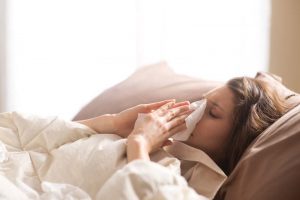With cold and flu season almost upon us, many people are looking for remedies to add to their arsenal against illness. From natural preventatives such as vitamin C to medical treatments like flu shots, Americans spend millions every year simply trying not to get sick. And it’s no wonder; illness can be very expensive, between doctor’s visits and missed work. A new study in circadian biology suggests that you have a lower chance of getting sick if you add getting adequate sleep to your illness prevention regimen.
Sleeplessness: A Public Health Epidemic
While you will hear a great deal about different epidemics in the upcoming months, you are less likely to hear about the raging epidemic of insufficient sleep. The CDC estimates that 50-70 million Americans have a disorder affecting their sleep and circadian rhythm. In addition, modern life seems tailored to disrupt our natural cycles, with lights and stress that don’t turn off at night. Altogether this epidemic contributes to millions of dollars in expenses from accidents, lost productivity and chronic illness. This new study, published by chronobiology researchers in Sleep Journal, suggests that not getting enough sleep may have another negative effect as well: Depressing the immune system.
Sleep and the Immune System

This study was not initially surprising; prior research has noted that people who sleep less are sick more often. However, many researchers questioned whether sleep or a third factor was responsible for this. After all, older people and people who are under stress both tend to sleep less and also, for reasons unrelated to circadian biology, catch illnesses more easily. Because of these possible confounding factors, researchers in this study adjusted the data to compare people who had similar age, stress and other factors. Even when the data was adjusted for stress, race and ethnicity, age, income and other factors, people who slept less were more susceptible to illness.
How Can Sleep Prevent Illness?
Sleep and sleeplessness have both been found to affect the immune system in a variety of ways. T-cells, which are important in the fight against viruses, begin decreasing in numbers when people are sleep deprived. In addition, inflammatory cytokines increase in numbers. Cytokines are responsible for the cellular inflammation that causes many unpleasant symptoms of cold and flu. Sleep is also important in fighting off an illness after it has taken hold, which is why we are more tired when we are sick.
The effects of sleep and sleeplessness on health is a major area of study in chronobiology. Maintaining a healthy circadian rhythm is essential to good health. The next time everyone in your workplace or classroom is sneezing and sniffling, getting a long and undisturbed sleep should be your first line of defense.







